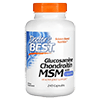5 joint support supplements
In this informational article , we will explore five supplements that are widely recognized for their potential to support joint health. By delving into the practical aspects of these supplements and their relevance to physical exertion and athletes, we aim to provide valuable insights for individuals seeking effective strategies to promote joint well-being.
#1 Supplement
Glucosamine
Glucosamine is a naturally occurring compound found in the body, specifically in the fluid around joints. It plays a vital role in the formation and repair of cartilage, which cushions and protects the joints.
Glucosamine is commonly available as a dietary supplement, often derived from shellfish shells or synthesized in the laboratory. It is typically combined with other ingredients like chondroitin sulfate or MSM (methylsulfonylmethane) to enhance its effectiveness in supporting joint health (see below).
Benefits of glucosamine for joint health
Glucosamine has been widely studied for its potential benefits in promoting joint health. One of its primary advantages is its ability to support the production of cartilage, the flexible connective tissue that covers the ends of bones in joints.
By providing the necessary building blocks for cartilage synthesis, glucosamine aids in maintaining joint structure and function. Additionally, glucosamine may have anti-inflammatory properties, helping to reduce joint inflammation and alleviate discomfort associated with conditions such as osteoarthritis.
Preferred forms of glucosamine
When selecting a form of glucosamine for joint support, it is important to consider individual preferences and needs. Glucosamine is commonly available in three forms: glucosamine sulfate, glucosamine hydrochloride, and N-acetylglucosamine.
Glucosamine sulfate is the most researched and widely used form, known for its potential effectiveness in supporting joint health.
Glucosamine hydrochloride is another commonly available form and may be suitable for individuals with shellfish allergies, as it is often derived from non-shellfish sources. N-acetylglucosamine is less studied in the context of joint health but may offer additional benefits for other aspects of overall health, such as digestive and immune health.
Dosages of glucosamine
The appropriate dosage of glucosamine can vary depending on individual needs and the specific product used. Generally, the most commonly recommended dosage for oral glucosamine supplements is around 1,500 mg to 2,000 mg per day, divided into multiple doses.
It is important to follow the instructions provided on the product label or consult with a healthcare professional to determine the optimal dosage based on individual circumstances and any existing health conditions.
Potential side effects
Glucosamine is generally considered safe for most individuals, with few reported side effects. However, some people may experience mild gastrointestinal symptoms such as nausea, diarrhea, or indigestion.
Individuals with shellfish allergies should be cautious when using glucosamine derived from shellfish sources. Glucosamine may also interact with certain medications, such as blood thinners, so it is important to consult with a healthcare professional before starting any new supplement regimen.
Recommendations for optimal effectiveness
To achieve the best possible results when using glucosamine for joint support, it is important to maintain consistency and follow a few key recommendations.
Firstly, it is essential to give the supplement sufficient time to work, as it may take several weeks or even months to experience noticeable benefits. Additionally, combining glucosamine with a healthy lifestyle that includes regular exercise, maintaining a healthy weight, and consuming a balanced diet can further enhance its effects.
Lastly, it is crucial to choose high-quality supplements from reputable manufacturers and consult with a healthcare professional for personalized advice and guidance based on individual needs and health conditions.
#2 Supplement
Сhondroitin
Chondroitin is a naturally occurring substance that belongs to a class of compounds called glycosaminoglycans (GAGs). It is a vital component of cartilage, which is the flexible connective tissue that cushions and protects the joints.
Chondroitin is commonly sourced from animal cartilage, such as that from cows, pigs, or sharks, and is available as a dietary supplement.
Benefits of chondroitin for joint health
Chondroitin has been extensively studied for its potential benefits in supporting joint health. One of its primary advantages is its ability to promote the synthesis of cartilage components, such as proteoglycans and collagen, which are essential for maintaining the integrity and elasticity of joints.
By supporting the production and repair of cartilage, chondroitin helps to improve joint mobility, reduce pain, and alleviate the symptoms of conditions like osteoarthritis.
Preferred forms of chondroitin
When selecting a form of chondroitin for joint support, it is important to consider the purity and quality of the product. Chondroitin sulfate is the most commonly available and well-researched form of chondroitin.
It is often combined with glucosamine or other joint-supporting ingredients to enhance its effectiveness.
Dosages of chondroitin
The appropriate dosage of chondroitin can vary depending on individual needs and the specific product used. Generally, a common dosage range for chondroitin sulfate is 800 mg to 1,200 mg per day, divided into multiple doses.
It is important to follow the instructions provided on the product label or consult with a healthcare professional to determine the optimal dosage based on individual circumstances and any existing health conditions.
Potential side effects
Chondroitin is generally well-tolerated, and serious side effects are rare. However, some individuals may experience mild gastrointestinal symptoms such as nausea, diarrhea, or constipation. In rare cases, allergic reactions to chondroitin have been reported.
If you have any pre-existing health conditions or are taking medications, it is advisable to consult with a healthcare professional before starting any new supplement regimen.
#3 Supplement
Methylsulfonylmethane
Methylsulfonylmethane (MSM) is an organic sulfur compound that occurs naturally in plants, animals, and humans. It is also available as a dietary supplement.
MSM is a popular choice for joint support due to its potential role in promoting joint health and reducing inflammation. It is commonly derived from natural sources such as pine trees or synthesized in a laboratory.
Benefits of methylsulfonylmethane for joint health
MSM has several potential benefits for joint health. Firstly, it is believed to support the integrity and flexibility of connective tissues, including cartilage. By aiding in the formation and maintenance of healthy cartilage, MSM may help reduce joint pain, improve mobility, and support overall joint function.
Additionally, MSM has been suggested to possess anti-inflammatory properties, which can help alleviate swelling and discomfort associated with joint conditions like osteoarthritis.
Preferred form of methylsulfonylmethane for joint support
Methylsulfonylmethane is commonly available in powder, capsule, or tablet form. When choosing a form of MSM for joint support, it is important to consider individual preferences and needs.
While there is no significant difference in effectiveness between these forms, it is advisable to select a high-quality MSM supplement from a reputable manufacturer to ensure purity and potency.
Dosages of methylsulfonylmethane
The optimal dosage of methylsulfonylmethane can vary depending on individual factors and the specific product used. For joint health, a common dosage range is around 1,000 mg to 3,000 mg per day, divided into multiple doses.
However, it is crucial to follow the instructions provided on the product label or consult with a healthcare professional to determine the appropriate dosage based on individual circumstances and any existing health conditions.
Potential side effects
MSM is generally considered safe for most individuals when taken at appropriate dosages. Side effects are rare but can include mild gastrointestinal symptoms such as bloating, diarrhea, or nausea.
Some individuals may experience allergic reactions, although these are uncommon. As with any supplement, it is important to consult with a healthcare professional before starting MSM, particularly if you have any pre-existing health conditions or are taking medications.
Recommendations for optimal effectiveness
To achieve the best possible results when using MSM for joint support, it is important to maintain consistency and adhere to a few recommendations. Firstly, give MSM sufficient time to work, as it may take several weeks or even months to experience noticeable benefits.
Additionally, combine methylsulfonylmethane supplementation with a healthy lifestyle that includes regular exercise, a balanced diet, and maintaining a healthy weight.
These factors can further support joint health. Lastly, choose MSM supplements from reputable manufacturers and consult with a healthcare professional for personalized advice and guidance based on individual needs and health conditions.
Glucosamine, Chondroitin, and MSM all in one
The modern market of dietary supplements offers products that contain Glucosamine, Chondroitin, and MSM all in one. One such product is Doctor's Best Glucosamine Chondroitin MSM with OptiMSM, which has received numerous positive reviews.
This supplement provides a convenient and comprehensive solution for supporting joint health with its combination of these three key ingredients.
#4 Supplement
Curcumin
Curcumin is a natural compound derived from turmeric, a spice commonly used in cooking. It is known for its bright yellow color and numerous potential health benefits. Curcumin is a potent antioxidant and anti-inflammatory agent, making it a popular choice for promoting joint health.
Advantages of сurcumin for joint health
The use of curcumin for joint health offers several advantages. Its anti-inflammatory properties help reduce inflammation in the joints, which can alleviate pain and stiffness.
Curcumin also supports joint mobility and flexibility by promoting the health of cartilage, the cushioning tissue that protects the ends of bones in a joint. Additionally, curcumin may help slow down the progression of joint damage in conditions such as osteoarthritis.
Preferred form of curcumin for joint support
The preferred form of curcumin for supporting joint health is typically curcumin extract standardized to contain a high concentration of curcuminoids, the active compounds in turmeric.
This concentrated form ensures a higher potency and bioavailability, allowing for better absorption and utilization by the body. Curcumin supplements are available in various forms, including capsules, tablets, and liquids.
Recommended dosages of curcumin
The recommended dosages of curcumin can vary depending on the specific product and individual needs. In general, a typical dosage range for curcumin supplements is 500 to 2,000 milligrams per day.
However, it is important to follow the instructions provided by the manufacturer or consult with a healthcare professional for personalized dosage recommendations. Factors such as the severity of symptoms, overall health, and specific health conditions may influence the appropriate dosage.
Possible side effects
Curcumin is generally considered safe for most people when taken in recommended doses. However, some individuals may experience mild gastrointestinal symptoms, such as stomach upset or diarrhea, when taking higher doses.
It is advisable to start with a lower dosage and gradually increase it if needed to minimize the risk of side effects. As with any supplement, it is always recommended to consult with a healthcare professional before starting curcumin or any new supplement.
Recommendations for optimal effects
To achieve the best effects from curcumin supplementation, it is important to ensure a consistent and long-term approach. Regular and sustained use of curcumin supplements is more likely to yield noticeable benefits for joint health.
Additionally, curcumin can be enhanced in its absorption by consuming it with black pepper or a fat source. Remember to choose high-quality curcumin supplements from reputable brands to ensure purity and potency.
It is also important to maintain an overall healthy lifestyle, including regular exercise, a balanced diet, and maintaining a healthy weight, for optimal joint health.
#5 Supplement
Omega-3
Omega-3 fatty acids are a group of essential polyunsaturated fatty acids that play a crucial role in maintaining overall health. They are primarily found in fatty fish, such as salmon, mackerel, and sardines, as well as in certain plant sources like flaxseeds, chia seeds, and walnuts.
Benefits of Omega-3 for joint health
Omega-3 fatty acids offer several benefits for joint health. They possess anti-inflammatory properties that can help reduce inflammation in the joints, relieving pain and stiffness. Regular consumption of omega-3 fatty acids may also slow down the progression of joint damage in conditions like rheumatoid arthritis and osteoarthritis.
Additionally, omega-3 fatty acids promote the formation and maintenance of healthy joint cartilage, supporting overall joint structure and function.
Preferred form of Omega-3 for joint support
The preferred form of omega-3 for promoting joint health is typically through dietary sources, such as fatty fish. Consuming fish two to three times per week can provide an adequate intake of omega-3 fatty acids.
However, for individuals who have difficulty consuming enough omega-3-rich foods, high-quality fish oil supplements can be an alternative.
Dosages of Omega-3
The recommended dosage of omega-3 fatty acids can vary depending on the individual's health status, age, and specific needs. For general health maintenance, it is recommended to consume at least 250-500 milligrams of EPA and DHA combined per day.
However, for specific joint health benefits, higher dosages may be needed. In some cases, healthcare professionals may recommend higher doses of EPA and DHA, up to 2-4 grams per day, for individuals with certain joint conditions.
Potential side effects
Omega-3 fatty acids are generally safe for most people when consumed in recommended doses.However, high doses of omega-3 fatty acids, especially from fish oil supplements, may have some potential side effects, such as gastrointestinal disturbances, fishy aftertaste, and increased bleeding risk in individuals taking blood-thinning medications.
It is important to follow recommended dosages and consult with a healthcare professional if you have any underlying medical conditions or are taking medications.
Recommendations for optimal effectiveness
To achieve the best effects from omega-3 fatty acids, it is important to maintain a consistent intake. Incorporating omega-3-rich foods into your diet, such as fatty fish or other seafood, is an excellent way to ensure regular consumption.
If using fish oil supplements, store them properly to maintain their freshness and effectiveness. Additionally, combining omega-3 intake with a balanced diet, regular exercise, and overall healthy lifestyle habits will further support joint health and overall well-being.


























Log in with ( Sign Up ? )
or post as a guest
Be the first to comment.